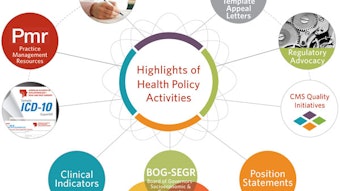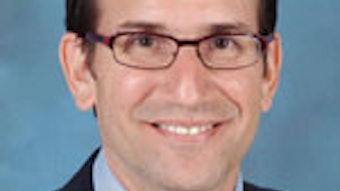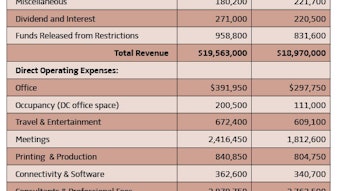ICD-10 Delay: Was It Worth the Wait
The 2014 AAO-HNS Leadership Forum which took place March 2-3 in Alexandria, VA, was a rousing success bringing AAO-HNS, BOD, and BOG members (including a significant number of otolaryngology residents) together to discuss a wide variety of topics including the transitioning to ICD-10 coding. Robert R. Lorenz, MD, gave an informative talk on where our practices should be in the ICD-10 transition process as we approached the scheduled October 1, 2014 deadline. Shortly after that meeting the U.S. House of Representatives changed that schedule when it quickly passed by voice vote bill HR 4302, “Protecting Access to Medicare Act 2014.” This bill, which was also passed by the Senate and signed by the President, delayed the onset of the ICD-10 changes by a minimum of one year, now starting no earlier than October 1, 2015. On its face this legislation could have appeared to be a win for many of our independent practice colleagues who may not have been on schedule for the October 1, 2014 deadline. However, this postponement of the ICD-10 implementation could also be viewed as a wolf in sheep’s clothing due to the Sustainable Growth Rate (SGR) patch that was once again used to delay a permanent fix to this broken system of adjusting Medicare payments. The AAO-HNS has been committed to supporting legislation to repeal the SGR for the last several years. They have worked to educate Congress regarding the instability of the Medicare payment system. They have repeatedly outlined to Congress that this instability in the Medicare payment system is threatening our patients’ access to healthcare by making it difficult for our members to make plans for the future of their practices, to invest in their practices, to provide for their employees and to make investments to help improve the quality and efficiency of the care they provide. The quick passage of yet another SGR patch ignores significant cooperative efforts and sacrifices offered by the House of Medicine over the past year to permanently fix the SGR. The cost of fixing the SGR had never been as affordable as it was this past year yet all these efforts were brushed aside and the SGR can was once again kicked down the road. The short-term gain of an ICD-10 delay seems to have sugar-coated this otherwise bitter political pill. Delay in the implementation of the ICD-10 system has in its own right caused some concerns for many institutions who were “on track” for the October 1, 2014 implementation date. Many institutions have spent millions of dollars and significant time and effort in preparing for the implementation. The delay in the timeline so close to the start date means that the delay occurs just as the testing of the modified systems was set to begin. Testing typically occurs in the last six months checking how the system will work with third party payers. There are significant resources put into the education of the providers and staff as well. Many organizations have contracts with outside consultants hired to educate the providers. These contracts may need to be amended or extended to avoid a large gap between the time of education and the time of implementation of the new paradigms. Some institutions may have to maintain both the ICD-9 and ICD-10 systems in parallel until the change is made permanently. This can significantly alter an institution’s project management perspectives. Another issue is that the change in implementation date is not yet fixed as the legislation reads “not before” Octobert 1, 2015 which means this could be delayed yet again. Since the decision was taken out of the hands of CMS (which had vowed not to delay ICD-10 implementation ever again) we are left with Congress once again holding hostage our ability to plan for the future of our practices. The brave new world of healthcare reform continues to show us an ever-changing and therefore unpredictable landscape. We must continually educate our colleagues and our representatives as to the ultimate impact of many of the decisions made in our state houses and in Washington. We should never lose sight of the forest for the trees! References AAO-HNS Overview: Federal Legislative Priorities. Government Affairs, www.entnet.org/advocacy. Carr, David. ICD-10 Delay Creates Headaches. Information Week Healthcare 4/3/14.
 Denis C. Lafreniere, MD,
Denis C. Lafreniere, MD,BOG, Immediate Past Chair
The 2014 AAO-HNS Leadership Forum which took place March 2-3 in Alexandria, VA, was a rousing success bringing AAO-HNS, BOD, and BOG members (including a significant number of otolaryngology residents) together to discuss a wide variety of topics including the transitioning to ICD-10 coding. Robert R. Lorenz, MD, gave an informative talk on where our practices should be in the ICD-10 transition process as we approached the scheduled October 1, 2014 deadline. Shortly after that meeting the U.S. House of Representatives changed that schedule when it quickly passed by voice vote bill HR 4302, “Protecting Access to Medicare Act 2014.” This bill, which was also passed by the Senate and signed by the President, delayed the onset of the ICD-10 changes by a minimum of one year, now starting no earlier than October 1, 2015. On its face this legislation could have appeared to be a win for many of our independent practice colleagues who may not have been on schedule for the October 1, 2014 deadline. However, this postponement of the ICD-10 implementation could also be viewed as a wolf in sheep’s clothing due to the Sustainable Growth Rate (SGR) patch that was once again used to delay a permanent fix to this broken system of adjusting Medicare payments.
The AAO-HNS has been committed to supporting legislation to repeal the SGR for the last several years. They have worked to educate Congress regarding the instability of the Medicare payment system. They have repeatedly outlined to Congress that this instability in the Medicare payment system is threatening our patients’ access to healthcare by making it difficult for our members to make plans for the future of their practices, to invest in their practices, to provide for their employees and to make investments to help improve the quality and efficiency of the care they provide. The quick passage of yet another SGR patch ignores significant cooperative efforts and sacrifices offered by the House of Medicine over the past year to permanently fix the SGR. The cost of fixing the SGR had never been as affordable as it was this past year yet all these efforts were brushed aside and the SGR can was once again kicked down the road. The short-term gain of an ICD-10 delay seems to have sugar-coated this otherwise bitter political pill.
Delay in the implementation of the ICD-10 system has in its own right caused some concerns for many institutions who were “on track” for the October 1, 2014 implementation date. Many institutions have spent millions of dollars and significant time and effort in preparing for the implementation. The delay in the timeline so close to the start date means that the delay occurs just as the testing of the modified systems was set to begin. Testing typically occurs in the last six months checking how the system will work with third party payers. There are significant resources put into the education of the providers and staff as well. Many organizations have contracts with outside consultants hired to educate the providers. These contracts may need to be amended or extended to avoid a large gap between the time of education and the time of implementation of the new paradigms. Some institutions may have to maintain both the ICD-9 and ICD-10 systems in parallel until the change is made permanently. This can significantly alter an institution’s project management perspectives. Another issue is that the change in implementation date is not yet fixed as the legislation reads “not before” Octobert 1, 2015 which means this could be delayed yet again. Since the decision was taken out of the hands of CMS (which had vowed not to delay ICD-10 implementation ever again) we are left with Congress once again holding hostage our ability to plan for the future of our practices.
The brave new world of healthcare reform continues to show us an ever-changing and therefore unpredictable landscape. We must continually educate our colleagues and our representatives as to the ultimate impact of many of the decisions made in our state houses and in Washington. We should never lose sight of the forest for the trees!
References
AAO-HNS Overview: Federal Legislative Priorities. Government Affairs, www.entnet.org/advocacy.
Carr, David. ICD-10 Delay Creates Headaches. Information Week Healthcare 4/3/14.

















